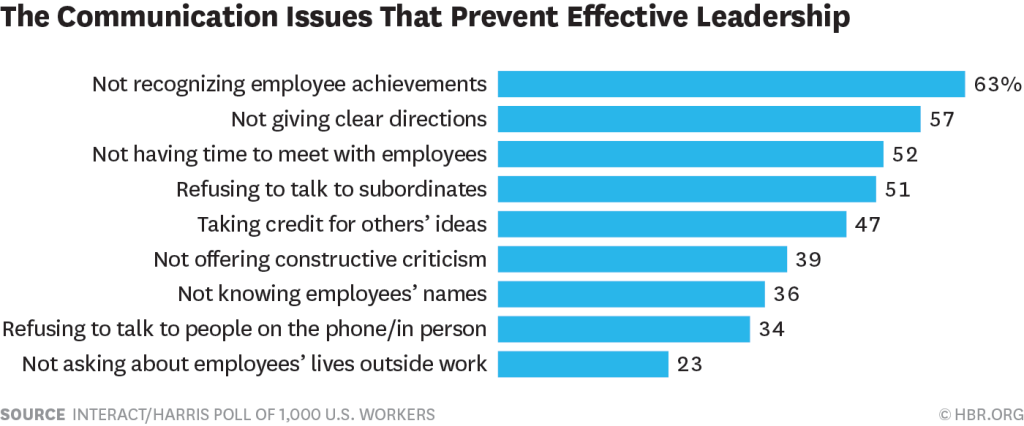16 Defining Characteristics of Quality Leaders
Quality leaders aren’t born — they’re made. In fact, very few people make ...

If you’ve spent any time at all working with a team, I’m sure you’ll agree that there are effective leaders and there are ineffective leaders. Effective leaders motivate their team to do great things. Ineffective leaders often have undermotivated, underperforming employees.
The good news is, like most other skills, leadership is a skill that can be honed and developed. All it takes is an understanding of what motivates employees and a willingness to make improvements. Here are 11 habits of highly effective leaders.
Every employee is different. Some need very little instruction—a general idea and off they’ll go. Other employees need lots of detail and discussion before they understand what they’re supposed to do.
As an effective leader, your job is to give your employees what they need to be successful. If that means a few specific commands for the employee who needs little instruction, that’s what you give them. If that means talking for an hour with the employee about every aspect of the task, that’s what you give them.
I once had a server at my restaurant who was extremely intuitive. He picked up the job very quickly. However I made the nearly catastrophic mistake of assuming that all other hires I made would have the same intuition. This left me with an under trained staff who I then had to invest a lot of time and energy into training. It was a lesson I never forgot.
The support you provide your employee doesn’t end once they hit the floor. Be approachable from beginning to end. When you make yourself available, your employees will feel comfortable asking questions when they need to. When your employees ask questions, problems can be avoided before they come up.
Because praise is such a simple thing, many leaders overlook it. According to a Harris poll of 1,000 workers, 63% complained that they weren’t recognized for their achievements. Fortunately, recognizing small things can make a big difference.

Giving your employees a thumbs-up or a pat on the back now and again, can make them feel appreciated and that they are making progress towards a goal. I’m sure to count the little things. If my employee is particularly good at folding napkins, I let him know. If she is able memorize orders without writing them down, I’m sure to commend her memory. Praise is a positive motivator and can make your employees work harder in the future.
Giving praise doesn’t have to be a major production. Say, for example, that a big party comes into your restaurant at the end of the night and a server stays late (and stays energized) to make them happy. The next day, pull that server aside and let them know that you saw what they did and that you appreciate their efforts. Simple praise like that can go a long way toward keeping your team motivated to perform.
As Ralph Waldo Emerson famously wrote, “What you do speaks so loudly I cannot hear what you say.” What Emerson put in poetic language basically boils down to “lead by example”.
If you’re not willing to put in the hard work and get the job done, why should your employees? There’s more to being a leader than just assigning tasks and going home. Effective leaders are the trailblazer of an exploring party: they’re out in front clearing the way for the rest of the team behind them.
As a small business owner, you have to be willing to do every single job, from fry cook to waiter to dishwasher, if the need arises. You have to show your team the success of your business means everything to you and that you’re willing to do whatever it takes to ensure success. When your team sees you leading the way and going the extra mile, they will feel motivated to match your efforts.
An effective leader is always ready to listen to her employees. By doing so, she can understand how her employees work. She can understand their strengths and weaknesses. She can understand what leadership style is most effective for them.
The effective leader knows that listening to feedback and ideas is a form of positive reinforcement—it lets the employee know that he is contributing and is a valuable member of the team.
If a leader neglects to listen, she runs the risk of being disconnected from real problems within the business. That can have ramifications down the road when these problems escalate. By listening and acting accordingly, effective managers can avert disaster and encourage team-building.
Effective leaders aren’t afraid to make the tough decisions. They gather the information they need, they make a decision and then they take action. Once the decision is made, the effective leader stands by her choice unless there’s a good reason to reconsider.

The authority of an effective leader is much like that of a ship’s captain. Though the crew of the ship may be doing the bulk of the work, the captain makes the final decision.
I had a combative employee who no matter how hard I tried to get him to follow my instructions, just wasn’t listening. So I had to let him go. While this wasn’t a popular decision with the staff, it was ultimately the best decision for my team and the health of my business.
The effective leader may have to make unpopular choices but his ultimate goal is the well-being of his ship and his crew. He has to see bigger picture.
It’s been said that tentative leaders make for tentative employees. Effective leaders avoid tentativeness and instead exhibit confidence. They are confident in their own abilities.
Self-confidence is especially critical when inevitable difficulties arise. Imagine that two servers call in sick right before opening on a busy night. A confident leader stays calm in the face of this dilemma. He is confident in his abilities to overcome these challenges. That type of confidence rubs off on employees and keeps them motivated. It can give them the boost they need to make the night run smoothly, even when understaffed.
Expressing trust in your team is about letting your team know that you are confident in their abilities. When you trust your team to get the job done, they feel empowered to continue performing at a high level.
I once came down with severe strep throat during busy season and couldn’t be in the restaurant for over a week. But because I trusted the team I had chosen, I knew they would be able to proceed without me until I was well again. And I was correct. Everything went fine.
Fostering a team that you know you can trust is critical to your business’s success. You cannot have any weak links if you want to survive the early years of a business.
Treat others how you want to be treated. This means being honest, fair and levelheaded, even when obstacles present themselves.
Your employees look to your example. If they see you being dishonest or unfair, they’ll likely follow suit. If they see you making the fair and honest choice even when it’s not in your best interest, they’ll do the same.
In the first year of my business I discovered that money was being taken from the register. I didn’t want to make any accusations so I waited until I caught the person redhanded. I made an example of him and showed my employees the integrity I expect.
Optimism means having a positive vision of the future. As a leader, optimism is about encouraging positivity in your team. Demonstrate optimism by looking on the bright side whenever possible. Look for the positives in your team members and in the situations you all face. Putting on an optimistic face when others succumb to doubt can go a long way to motivating your team to get the job done.
 Make it clear from the beginning that insults and pettiness will not be tolerated. Inspire your team members to be encouraging and supportive of the rest of the team.
Make it clear from the beginning that insults and pettiness will not be tolerated. Inspire your team members to be encouraging and supportive of the rest of the team.
I set up a family style dinner and give a motivational pep talk every night before we open the floor for dinner, just to reassure my staff that I support and believe in them.
When everyone is encouraging, a productive work environment is created and employees feel safe to express ideas, speak their mind and tell the truth.
An effective leader needs to be able to adapt his leadership style to the ever changing personalities on his team. He must be able to adapt to new opportunities and new challenges.
The neighborhood my restaurant was in changed rapidly over the years that I owned it. What was once a family centric neighborhood soon developed into a lively nightlife scene. I changed my restaurant’s menu and drink list to reflect the needs of my customers. It took my ability to adapt to be able to survive.
By being flexible, you will find that you will be able to solve problems faster and more effectively.
Becoming an effective leader is not something you do overnight. It takes practice. But don’t let that deter you. Make your way through this list and begin making them habits. Above all, be adaptable to your own personality and the personalities of your team.
See Here For Last Updated Dates: Link
This content is for informational purposes and is not intended as legal, tax, HR, or any other professional advice. Please contact an attorney or other professional for specific advice.
Schedule faster, communicate better, get things done.